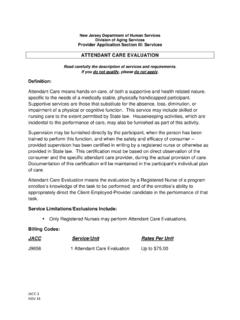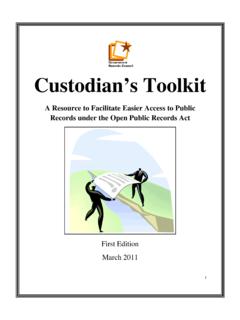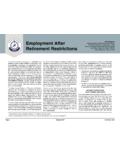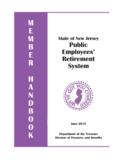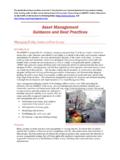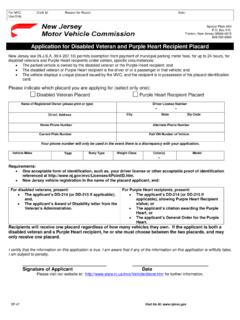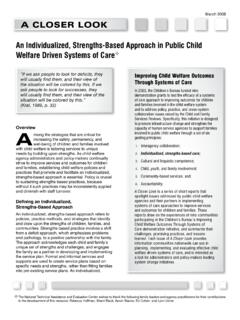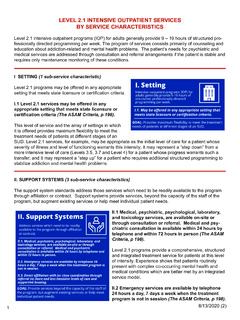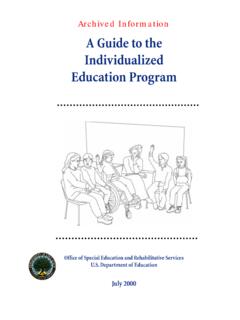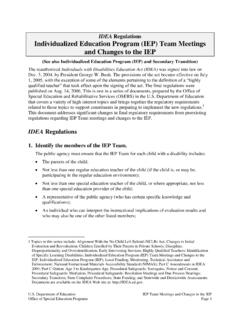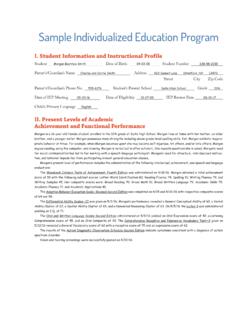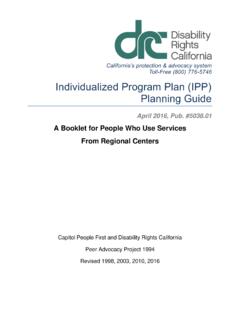Transcription of Early Intervention Services in New Jersey Frequently …
1 October 29 2015 Page 1 Early Intervention Services in New Jersey Frequently Asked Questions What Should You Do If You Think an Infant or Toddler Is Not Growing or Developing as He or She Should? Seek help Early . The first three years of life are important, formative years in maximizing a child's future potential. If you suspect that an infant or toddler may be experiencing developmental delays, the referral is made by calling the Regional System Point of Entry toll free number at 1-888-653-4463 and following the menu directions based on the county in which the child (or family) lives. If the child lives in Essex, Morris, Sussex, Union, or Warren County, please press 1 If the child lives in Bergen, Hudson, or Passaic County, please press 2 If the child lives in Atlantic, Burlington, Camden, Cape May, Cumberland, Gloucester, or Salem County, please press 3 If the child lives in Hunterdon, Mercer, Middlesex, Monmouth, Ocean, or Somerset County - or if you are not sure which county your child lives in, please press 4 (if no selection is made within 10 seconds, the message will repeat one time) (if no selection is made after the message is repeated, the incoming call will be transferred to Mid- Jersey CARES REIC) A service coordinator will talk with the family about their concerns and obtain referral information with family agreement.
2 The service coordinator will work with the family to schedule and obtain consent to conduct a multidisciplinary evaluation/assessment of the child's developmental levels and needs. Evaluation and assessment Services are provided at public expense with no cost to parents. Who Are Primary Referral Sources? The Department of Health has established procedures for use by primary referral sources for referring a child. Primary referral sources include: hospitals, physicians, parents, child care programs, local educational agencies, public health facilities, other social service agencies, and other health care providers. Primary referral sources in New Jersey must: Maintain written documentation that supports the parent's agreement to refer or the parent's request that a referral not be made; Explain the Early Intervention Services which would be available if the referral were made and the consequences of not accessing those Services through the referral process, and state that referral does not commit the parent to participate in the Early Intervention system (parent consent is required for evaluation and assessment); and Maintain follow-up contacts with those families who initially request a referral not be made.
3 Who is Eligible? To be eligible for Early Intervention Services through the NJEIS, a child must meet the criteria in at least one of the following two categories: October 29 2015 Page 2 Developmental Delay 1. Must be measured with the NJEIS designated standard evaluation tool, appropriate diagnostic instruments and procedures, including clinical opinion in all of the following areas of development: Physical (gross motor, fine motor, vision and hearing); Cognition; Communication; Social or emotional; and Adaptive. To be eligible, a child must demonstrate measured delays in development of at least standard deviations below the mean in one developmental area; or standard deviations below the mean in two or more of the developmental areas. 2. Conditions with High Probability This category of eligibility includes children who have identified conditions but who may not be exhibiting delays in development at the time of eligibility.
4 Children are eligible who have a diagnosed physical or mental condition that has a high probability of resulting in developmental delay. The high probability diagnosis must be confirmed in a signed statement or report from a physician; advanced practice nurse; or licensed clinical psychologist in the child s record including a statement that the diagnosed condition for the child has a high probability of developmental delay. What is an Evaluation? An evaluation is the process of gathering information about the child to see how he or she is developing and is used to determine eligibility for Early Intervention Services . The evaluation is conducted by qualified professionals, in conjunction with the family, and provides information in several developmental areas such as communicating, feeding, behavior, walking/movement, vision, and hearing.
5 The evaluation also assists in defining the types and levels of Services needed by the child and family. Written parent consent is needed before the evaluation can begin. What are Early Intervention Services ? Early Intervention Services are designed to address a problem or delay in development as Early as possible. The Services are available for infants and toddlers up to age three. Public and private agencies serve as Early Intervention Program providers (EIPs) and arrange for Early Intervention practitioners to address the needs of eligible children and their families. Following the evaluation and assessment, an individualized Family Service Plan (IFSP) is developed to describe the Services that are needed by the child and family and how they will be implemented. Services are provided by qualified practitioners in natural environments, settings in which children without special needs ordinarily participate and that are most comfortable and convenient for the family such as: home, a community agency, or child care setting.
6 Early Intervention recognizes and respects the important and central role of the family in their child s life. The purpose of Early Intervention is to promote the child and family s ability to meet developmental outcomes, chosen by the family and outlined in the individualized Family Service Plan (IFSP). Developmental Intervention helps families and Early Intervention practitioners implement child-focused Services through a team approach that facilitates development within natural settings and activities and in the context of meaningful relationships. EIP practitioners, service coordinators, families, and designated community agencies can work together as a team to meet the child and family s needs and support each child s growth and development. October 29 2015 Page 3 Children eligible for Early Intervention receive developmental Intervention to address developmental delays.
7 They may or may not also be receiving discipline-specific therapy(ies) and family support Services . Developmental Intervention will be provided at the intensity and frequency determined by the IFSP team, which always includes family members. Discipline-specific therapies and family support Services are incorporated into IFSPs based on the child and family s assessment information. Developmental Intervention includes (but is not limited to) these types of activities: promoting a positive parent-child relationship as the core of Intervention efforts; identifying activities and daily routines which can be utilized as learning opportunities for the child; working directly with the child and any other persons identified by the family; sharing knowledge of child development with families; teaching the family to design learning environments and materials to promote the child s acquisition of a variety of skills; networking with and providing consultation to community providers and friends that the family chooses; monitoring progress toward meeting developmental outcomes.
8 And coordinating the Intervention activities that are provided within the NJEIS team. The purpose of discipline-specific therapy is to meet a specific therapy objective which will enhance the child/family s ability to meet a larger developmental outcome that the family has consented to include in the IFSP. The need for discipline-specific therapy is determined by an evaluation or assessment by a therapist from the area of concern. The frequency and intensity of the therapy are determined by the entire IFSP team which considers what is needed to meet the outcomes and how the Services will fit into the family s daily routines. Early Intervention practitioners are assigned by the EIP agency based on the knowledge, skills, and expertise needed to meet the developmental outcomes on the IFSP. The IFSP team decides whether the Early Intervention Services will be provided individually, in groups or utilizing a consultative model of Intervention .
9 The IFSP can include one or a combination of any of the following Services : Assessment - Ongoing procedures to identify the child's strengths and developmental needs, as well as the family's concerns, priorities, resources. Assistive Technology - Provision of equipment, including adaptive assistive devices, which have been designed or altered for special use by children with developmental delays or disabilities. Audiology Services - Testing of the child's hearing and referral for further Services , as needed. Developmental Intervention - Designing learning activities that promote the child s acquisition of skills in a variety of developmental areas. Family Training and Counseling - Guidance for the family, such as help from trained personnel in understanding the special needs of the child and enhancing the child's development.
10 Health Services - Assistance to enable a child to benefit from other Early Intervention Services , including: clean intermittent catheterization, tracheotomy care, tube feeding, October 29 2015 Page 4 the changing of dressings or colostomy collection bags, and consultation with service providers concerning special health care needs. Medical Services - Diagnostic or evaluation Services by a licensed physician to determine a child's developmental status and the need for Early Intervention Services . The Early Intervention system does not pay for other medical Services . Nursing Services - Assistance to enable a child to benefit from Early Intervention Services , including: health status assessments and nursing care to prevent health problems or to improve functioning. Nutrition - Individual assessment, development, and monitoring of plans to address the child's nutritional needs.
